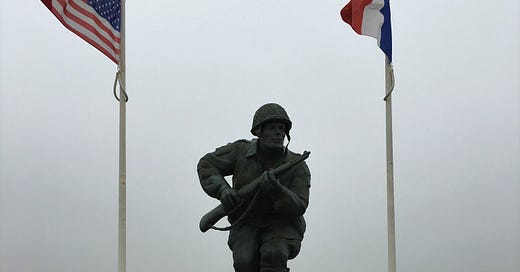Pentecost: D-Day for the Holy Spirit
“Everyone who calls on the name of the Lord shall be saved”
“Wars do not make men great, but they do bring out the greatness in good men.” - Richard “Dick” Winters
Yesterday marked the 81st anniversary of the D-Day landings in Normandy; and tomorrow marks the 7th Sunday after Easter, better known as Pentecost, which commemorates the descent of the Holy Spirit upon Jesus’ apostles. In light of last week's piece, this chronological coincidence led me to reflect on themes might resonate across these two pivotal days. I argue in my dissertation, The Love of Truth and the Truth of Love, that the patterns revealed in Scripture continue across history. Consider this post a kind of thought experiment to test this hypothesis.
It struck me that both the D-Day landings and Pentecost took place “under fire.” Soldiers going ashore on the Normandy beaches were walking into murderous machine gun and artillery fire. I can scarcely imagine what this kind of fire would have been like, or the courage needed to face it. Although this fire was destructive in nature, I am in awe of how servicemembers’ virtue and self-sacrifice empowered them to overcome what must at first have seemed almost impossible as they went on in the face of death to liberate Western Europe from the evil of Nazi tyranny.
The Book of Acts’ account of Pentecost portrays the apostles as under the fire of the Holy Spirit. As it says, “tongues like fire appeared to them, divided themselves, and sat on each one of them. And they were all filled with the Holy Spirit and began to speak in other tongues, as the Spirit was giving them to speak out” (2:3-4). Some thought that they were under the influence. Peter explained they were not filled with wine, but the Spirit of God, in fulfillment of the prophecy of Joel, who said God would pour it out upon all flesh. Sons, daughters, young, old, free: “everyone who calls on the name of the Lord shall be saved” (2:21; Joel 2:32; cf. Romans 10:13). This fire is the opposite of destructive, though it still burns. Peter speaks of death, Jesus’ on the cross and how his audience bore responsibility, as prelude to proclaiming his victory over it and their need to repent. As a result of the apostles’ witness, about 3,000 people were baptized and received the gift of the Holy Spirit, representing the beginning of the church.
The other common theme that stands out is the international character of both days. On D-Day, troops from over a dozen different countries fought together as allies to free Europe from Nazi domination and restore peace to the world. Because of the Jewish Feast of Weeks (Shavuot), “there were devout Jews from every nation under heaven living in Jerusalem,” with 16 distinct nationalities named in the text (Acts 2:5,7-11). From its inception, the church has never been confined to the people of a single country. What happened at Pentecost marks the inauguration of the Great Commission to make disciples of all nations (Matthew 28:19-20). Christianity does not place one country above others—all people are God’s chosen people, and the promised land the whole earth.
Although D-Day and Pentecost are quite different events, thematic patterns such as these enable us to understand both history and revelation in light of each other. History is not only facts about the past; it is the story of how we made it to the present. We can consider events described in the Bible such as Pentecost to be historical but, as Faulkner famously wrote, “The past is never dead. It’s not even past.” God is pouring his Spirit out on all flesh right now, this very moment, today! We ourselves face the choice between the two different kinds of fire, that is, death or the Spirit. As T.S. Eliot describes this, humanity’s present conundrum, in "Little Gidding" (published in 1942):
The dove descending breaks the air
With flame of incandescent terror
Of which the tongues declare
The one discharge from sin and error.
The only hope, or else despair
Lies in the choice of pyre or pyre—
To be redeemed from fire by fire.
Who then devised the torment? Love.
Love is the unfamiliar Name
Behind the hands that wove
The intolerable shirt of flame
Which human power cannot remove.
We only live, only suspire
Consumed by either fire or fire.




